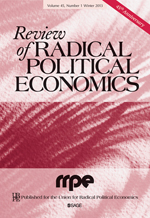How Societies Respond to Globalization
Are you looking for fresh perspectives on our global economic, social, and political reality? The Review of Radical Political Economics June 2013 issue offers critical insights including an explanation of what is behind New Deal nostalgia, a test of two different perceptions of capitalist competition, new book reviews, and more.
 In her review of Globalization and Transformations of Local Socioeconomic Practices, Tamar Diana Wilson of the University of Missouri, St. Louis writes about one of the nine “innovative” articles in this volume:
In her review of Globalization and Transformations of Local Socioeconomic Practices, Tamar Diana Wilson of the University of Missouri, St. Louis writes about one of the nine “innovative” articles in this volume:
In her article Ulrike Schuerkens makes it clear that the effects of globalization are heterogeneous and that “some societies are better positioned to become active participants in the global modernity than others.” She argues that processes of globalization, such as the penetration of commercial endeavors, do not necessarily mean capitalist development “as a system based on competition” in some of these societies. In Africa, for example, where many workers are target earners hoping to finance a dowry or a funeral or other socially sanctioned endeavor, higher salaries may mean workers seek employment for a lesser time period. Social capital is prized over economic capital, with one result being a dynamic informal economy. Shuerkens holds that wherever processes of globalization occur, with their intensification of “economic, political, and cultural relations across international borders,” some groups will continue to be disadvantaged and marginalized.
Click here to continue reading, and here to see all articles in the RRPE June 2013 issue. While you’re there, be sure to sign up for e-alerts so you don’t miss out on the latest research from the journal.























































































